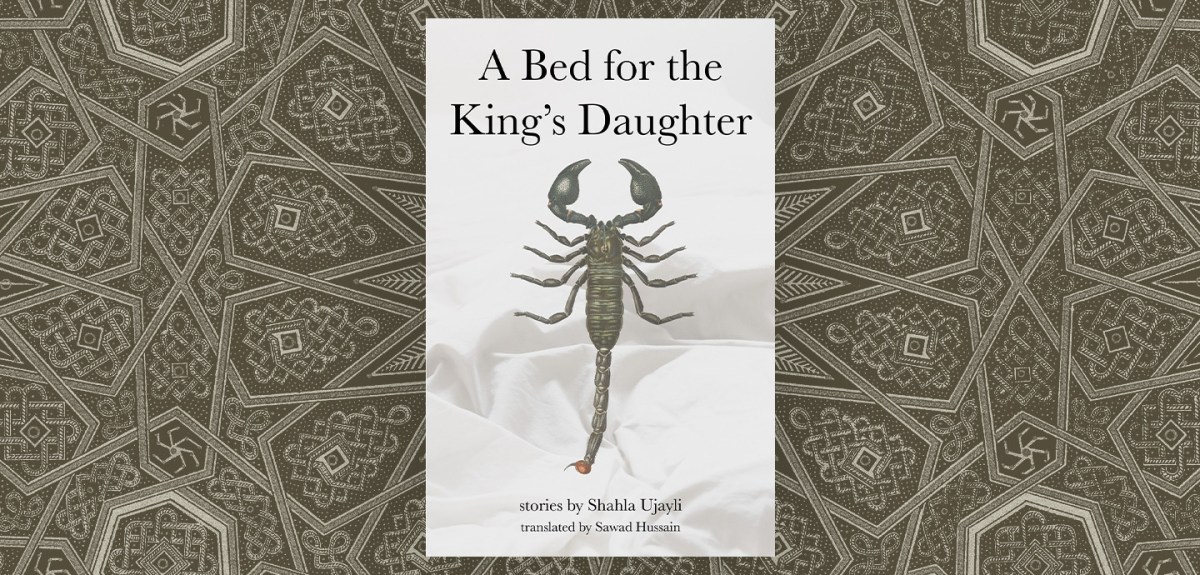[ad_1]
The grounds upon which A Bed for the King’s Daughter was passed up by English-language publishers also mark, perhaps unsurprisingly, the roots of its merits. Sawad Hussain samples these rejections in her translator’s note. That the twenty-two micro-fictions in Shahla Ujayli’s proportionately short collection were considered on the submission circuit to be “too short,” “too experimental,” or lacking in “sense of place” – whatever any of that means – should also be considered alternative praise.
Such remarks, of course, betray more about the American translation market than they do about Ujayli’s stories themselves, which won the Al-Multaqa prize in 2017. More troublingly, the remarks seem, unlike Hussain’s translational treatment, to underappreciate Ujayli’s vision, which straddles wonder and irony at every turn – and there are many turns in course. Indeed, these are stories based on turns their reader eventually learns to expect, but even then, in turn, they’re overturned.
A concern with narrative frame looms within many of the stories, and there’s a tendency, if not an urge, to implicate that frame, usually as a finishing touch, to draw it inward and destabilize its holdings. We see this explicitly in “Wishing Tree,” wherein a woman’s only Christmas wish – to have the time to write “Wishing Tree” down – is repeatedly foiled by domestic obligation; and again, in “A Bed for the King’s Daughter,” when a man, despite his active avoidance of a certain writer, realizes he’s just read her story. Its title: the title story’s.
In the frame narrative of said story, the reader is incriminated in the revelation, aligned – or exposed as having been aligned all along – with the inevitable; or in this case, aligned with the man avoiding the inevitable in both the frame narrative and the narrative within. So too, the gun, à la Chekov, goes off in “Gun License,” its timing precise, if not obvious. In “What Happened in the Wheat Field,” you see it coming before she does (spoiler: that’s not him, that’s a scarecrow in his clothes!).
Which is to say, Ujayli’s is a dramatic irony approaching marvel, a mode of upset expectations, of interruption as convention, and also of surprising narrative force. In “The Octopus,” there is only enough time to ask where the story’s going before it’s there, bluntly hanging at its trigger point. But where, exactly, Ujayli’s endings seem to ask, is the edge of there?
How do you sharply round out a story that is headed for a cliff? How do you make the sudden feel inevitable, circumventable, then over, as if all at once? Repeatedly, Ujayli manages it, if not to square the circle, then to circle the square and so every square within it.
The punchline, for instance, in “A Mother’s Final Words” gestures to generational cyclicality, so not a clean punch and not a line but an arc. The sudden is suddenly eternal, the frame within the frame gone. In “The Strangest Thing That Happened to Me in 2010,” an art history instructor receives in response to an exam question about surrealism a story in surrealistic mode, the text of which vanishes when the instructor finishes reading it.
“Successful Strikes” is perhaps the best example of the kind of ambient punchline these stories can set up and deliver, in that it exemplifies how Ujayli’s so-called experimentality is not so much a texture as it is the architecture of her writing. The story features two nameless women alternately voicing scenes, as if releasing memories, of physical tenderness cusping on violence. The meandering but charged recollections culminate in a single line wherein the scenes are found as if at a standstill, decades jammed into a crease:
“Now I have two scars on the back of my hand, twenty years apart.”
So if I’ve managed a “too short,” “too experimental” review devoid of a “sense of place,” consider it only an unstable frame for the accomplishments of this remarkable book of remarkable stories, and pardon if my sharp round turn lacks all of Ujayli’s grace and luster.

FICTION
A Bed for the King’s Daughter
By Shahla Ujayli
Center for Middle Eastern Studies, the University of Texas at Austin
Published January 19, 2021
[ad_2]
Source link
